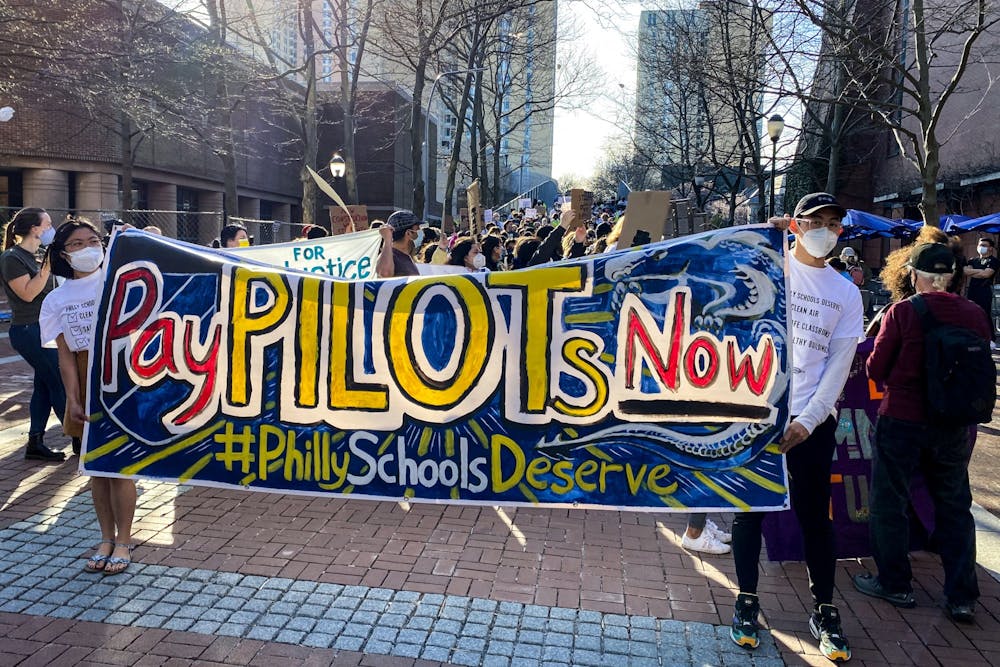
Students march down Locust Walk, demanding that Penn give payments in lieu of taxes (PILOTs) to the city of Philadelphia on March 30, 2021.
Credit: Nia RobinsonThe Philadelphia public school district is severely underfunded.
This is a result of decades of state neglect in funding, and with the costs mandated for school districts increasing rapidly, many schools are struggling to provide even the most basic resources and support for students.
As a student who grew up in an underfunded school district, I understand how the support from your surrounding community can mean the difference between succeeding or falling behind.
My primary and secondary education was often a game of make do. From worn textbooks to overburdened teachers, every aspect of my schooling was affected by the lack of funding and support. Reading wasn't just a matter of comprehension — it was a matter of deciphering the missing pages and defaced text. Science wasn’t just a matter of conducting experiments, but rather working with outdated equipment and becoming creative with the resources we had available.
The focus was not on learning, but rather managing.
The effects of underfunded school districts on students can have far-reaching consequences, extending beyond the classroom and into future career prospects and financial stability. I was fortunate enough to have had the opportunity to participate in a program aimed at closing these educational gaps. This program provided support and resources that helped me and other students overcome the challenges caused by underfunded schools. Sadly, however, not all students have access to such non-profit initiatives.
For the Philadelphia school district, a large source — almost half — of funding comes from local revenue, mostly generated from property taxes. Given that Penn is the largest private landowner in the city, one would expect a significant contribution from the University. However, as a tax-exempt organization, Penn is not currently required to pay any property taxes on its vast holdings.
This is where PILOTs come in, or payments in lieu of taxes. These are voluntary contributions made by tax-exempt organizations, such as non-profits and universities, to local governments in order to compensate for the tax revenue which would have otherwise been generated.
While Penn previously had an agreement in place for voluntary PILOTs from 1995 to 2000, making annual contributions of roughly $2 million, it was not renewed after these five years. Since then, many have brought attention to the matter, criticizing Penn for evading its financial obligation and moral responsibility to its surrounding community.
In the past, Penn has steered clear of directly responding to requests for PILOTs and instead chooses to focus on highlighting other initiatives, such as their $100 million pledge to the Philadelphia school district. Despite the impression this initiative may create, it remains important to evaluate whether Penn’s actions are truly addressing the issue at hand, or if they are merely superficial attempts to appear socially responsible. Not to mention how this pledge does not fully compensate for the PILOT payments that the city would have received from Penn.
Penn excuses their lack of payment in PILOTs through services in lieu of taxes (SILOTS), which provide specific services to the community such as tutoring and job training. Examples of this include community outreach programs facilitated by the Civic House and Netter Center.
However, SILOTs should only be seen as an addition to PILOTS, rather than a replacement. While these programs provide valuable services to the community, they do not amount to the funding in tax revenue the Philadelphia district forgoes.
While some may believe that Penn’s investment in the Penn Alexander School is sufficient compensation to Philadelphia's public school system, the benefits of this investment have primarily gone to the university community. The school has become almost a gated community of sorts, attracting university-affiliated families and contributing to the gentrification of the surrounding area. The investment is essentially displacing lower-income residents for whom the school was intended to serve in the first place.
Penn’s refusal to pay PILOTs leaves the public school district to rely on fewer resources to provide quality education for its students. This lack of funding can lead to overcrowded classrooms, outdated textbooks, limited access to technology and extracurricular activities, and a shortage of qualified teachers. All of these factors have a large impact on the academic performance and future opportunities of students in the public school system.
Many schools have also been forced to resort to relying on their faculty to supply essential resources for their classrooms and students. This burden falls disproportionately on teachers who already have to stretch limited resources to cover their own basic classroom needs, and often have to dip into their own pockets to purchase supplies like textbooks, software, and even furniture. This band-aid solution is not sustainable and ultimately puts a strain on both the teachers and the quality of education for the students who deserve better than temporary solutions that do not address the root of the issue.
Despite its nonprofit status, Penn’s refusal to pay PILOTs demonstrates the University’s prioritization of its own financial gain over the needs of the surrounding community. It is time for institutions like Penn to step up and invest in the education of our children, rather than continue to hoard their wealth and perpetuate inequities.
AKSA CHOUDHRY is a College first year studying health and societies from Elizabeth, NJ. Her email is aksa@sas.upenn.edu.
The Daily Pennsylvanian is an independent, student-run newspaper. Please consider making a donation to support the coverage that shapes the University. Your generosity ensures a future of strong journalism at Penn.
Donate



